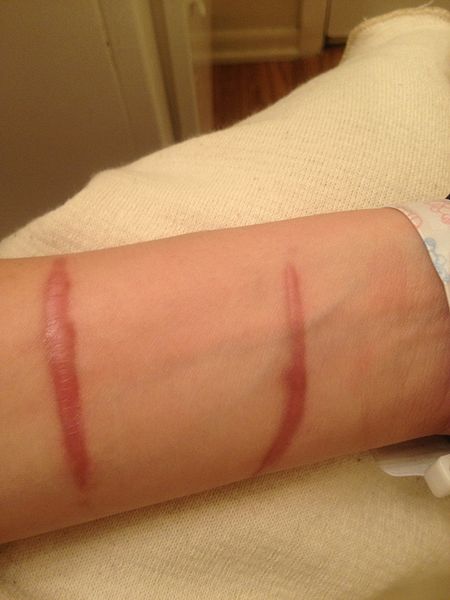Hypertrophic Scar : Treatments , Causes , Prevention
HYPERTROPHIC SCAR
A hypertrophic scar is a thick raised scar that's an abnormal response to wound healing . they more commonly occur in taut skin areas following skin trauma , burns or surgical incisions . treatments include medication , freezing , injection , lasers and surgery .
WHAT IS A HYPERTROPHIC SCAR ?
A hypertrophic scar is a thick raised scar . an abnormal response to wound healing in which extra connective tissue forms within the original wound area. the result a raised scar .
the top layer of your skin heals nicely . new skin forms as the would heals . deeper wound your body responds by making collagen to repair the wound . collagen is thicker than the rest of your skin . this thicker, less flexible tissue becomes a scar . this type of raised scar can be either a hypertrophic scar or a keloid .
CAUSES OF HYPERTROPHIC SCAR
Three phases of healing - inflammation , proliferation and remodeling . scar tissue forms during the remodeling phase . specific types of cells such as fibroblasts and myofibroblasts and certain signaling molecules such as transforming growth factor - beta and tumor necrosis factor are all involved in wound healing and the creation of new tissue . in both hypertrophic scar and keloids scar , this repair response goes haywire .the result is the abnormal production of extra collagen and a decrease in elastin , lead to these undesirable thick, raised stiff scars.
HYPERTROPHIC SCAR TREATED
The goals of hypertrophic scar treatments are to flatten , soften , reduce the size, lighten the color and ease any existing pain and itch of your scar . this allow the scar enough time to fully heal and possibly reduce in size and flatten on its own .
the most common treatment options for hypertrophic scars include:
CORTICOSTEROIDS INJECTIONS
this is a main treatment for hypertrophic scars . injections are made into the scar tissue . they flatten and soften scar tissues and ease pain and itch . several shots may be needed , each given a few weeks apart.
LASER THERAPY
Laser or pulsed dye lasers are the lasers commonly used to treat hypertrophic scars and keloids . they also can lighten the red or pink color color often seen in scars and reduce pain , itch and hardness . a fractionated laser may be used to put microscopic holes in the scar to soften it and tell it to remodel .
CRYOTHERAPY
Cryotherapy uses extreme cold to freeze and slowly destroy scar tissues , which helps flatten the raised tissues. this treatments may be combined with the other injection treatment options to further reduce the scar .
SURGERY
Sometimes surgery is performed to cut out the scar or redirect the lines of tension on the scar . when other treatments options have failed . this is because the surgery itself can result in scarring . surgery may be combined with other treatment to improve the results .
PREVENTING HYPERTROPHIC SCARS
A hypertrophic scar formation , since some factors are simply that can do lower your risk of getting hypertrophic scars on healing piercings .
- regularly clean new piercings by following your piercer's instructions.
- leave your jewelry alone while a piercing is healing
- use only products recommended by your piercer
- use silicone gel or sheets on new scars


Comments
Post a Comment